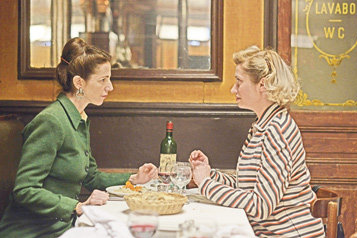“Violette,” opening July 18 at the Bryn Mawr Film Institute, is a classy, illuminating biographical drama about the bisexual writer Violette Leduc (Emmanuelle Devos). Artfully told in “chapters” — each named after the entity that informs the title character’s life and work — the film acutely captures Leduc’s despair and ultimate emancipation.
The opening scene has Leduc being imprisoned for three days. It is wartime, and she is at odds with her husband, Maurice Sachs (Olivier Py), a gay man who denies her sexually, emotionally and financially. Sachs trades for food on the black market and even gets beaten up for kissing a male contact, a situation that frustrates Leduc. Sachs’ only decent quality, it seems, is that he prompts her to start writing.
Leduc does, and after reading the work of Simone de Beauvoir (Sandrine Kiberlain), she screws up her courage to meet her new literary idol. She acts like a schoolgirl in her efforts to attract de Beauvoir both as a mentor and as a lover, stalking her, leaving her flowers and asking her to read her first manuscript. De Beauvoir admires the book, “In the Prison of Her Skin,” and is instrumental in getting it published. Thus begins a codependent relationship between the women. Leduc is needy while de Beauvoir craves the camaraderie of a smart, sensitive female writer who, like herself, cuts through the era’s stifling patriarchal culture. If the film does not emphasize their physical relationship, it certainly captures their emotional bond.
The best scenes involve de Beauvoir encouraging Leduc. When de Beauvoir asks Leduc about her abortion, the insecure writer responds bluntly, “One of us had to go.” When Leduc confesses her boarding-school relationship with another teen, de Beauvoir insists she write about it, observing, “Writing gives you everything society refuses you.” While Leduc’s work becomes increasingly honest, it also meets with disapproval by editors who suggest cutting the erotic passages. This causes the author, who is already discouraged by meager sales, to fall deeper into despair. Her financial ruin is staved off by stipends she receives periodically, and often in the nick of time.
“Violette,” co-written and directed by Martin Provost, excels in showing the difficulties women like Leduc — and to a certain, if slightly lesser, degree, de Beauvior — faced. Violette’s mother, Berthe (Catherine Hiegel), feels shamed by her daughter’s same-sex passions, calling it “silliness.” When Leduc is told to “find someone” (meaning a husband), she exasperatedly answers that that would mean “being different from who I am.” Such are the gender and sexual politics of the time when financial independence signified freedom for women.
One of the film’s highlights is when Leduc heads into the countryside and writes lengthy erotic passages about her teenage desires. A scene of her masturbating in a field epitomizes the emotional honesty in her writing, showing how this daring writer frees herself and finds freedom in her work. It is perhaps the film’s most powerful moment.
“Violette” makes its point that Leduc wrote about female sexuality and identity like no other woman. This is the film’s raison d’être: to acknowledge and celebrate the contributions of an under-known writer who paved the way for women writers both in the shadow of, and with the support of, de Beauvior.
Significantly, however, the film is not a hagiography. This is a warts-and-all biopic that shows Leduc’s episodes of madness as well as her financial despair and loneliness. Leduc has an awkward breakup with Hermine (Nathalie Richard), and a curious breakdown in a bookstore when the clerk suggests her volume received a small print run. Moreover, Leduc becomes jealous when de Beauvoir goes to America for three months, stalking her upon her return. She expresses her neurotic tendencies in her friendships and relationships with men, including Jacques Guérin (Olivier Gourmet), Jean Genet (Jacques Bonnaffé) and an unnamed lover (Stanley Weber). She has a complicated relationship with her disapproving mother.
“Violette” benefits from the strength of Devos’ committed performance in the lead role, as the extraordinary actor portrays a range of emotions, from fragile to triumphant with noticeable aplomb. In support, Kiberlain is impressive as de Beauvior, capturing the writer’s intensity in her body language, words and the terrific period costumes.
Provost obviously wanted to cram as much information about Leduc into his film as possible. If the film goes on a bit too long, his efforts only underscore his subject’s achievements.
